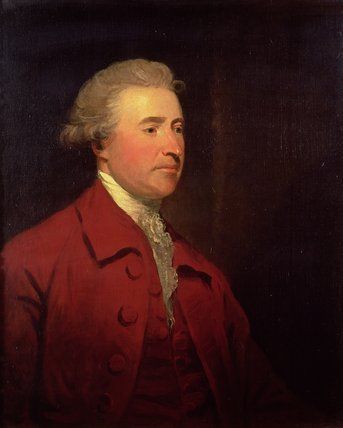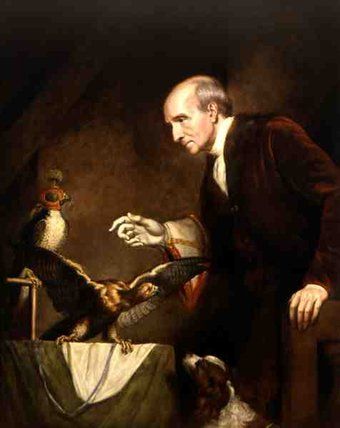
Portrait of Edmund Burke (1729-1797)
Date Painted c.1770–1780
James Northcote (1746-1831)
Oil on canvas
76.3 x 63.8 cm
Royal Albert Memorial Museum, Exeter, Devon, UK
Here is some background on the painter James Northcote:
James Northcote was one of a number of prominent painters of the 18th century who hailed from the Plymouth area of Devon, the most notable of whom was Sir Joshua Reynolds, the founder and first president of the Royal Academy of Arts in London. Today Northcote is chiefly admired for his portraits, though his paintings of animals found favour in his lifetime. In his later years he devoted an increasing amount of time to history paintings, including some scenes from Shakespeare's history plays which were exhibited in Boydell's Shakespeare Gallery. [The rest of the long biography is here].

Self Portrait as a Falconer, 1823
James Northcote
Oil on canvas
127.1x102 cms
Royal Albert Memorial Museum, Exeter, Devon, UK
-------------------------------------------------------------------------------------------------------------------------------------------------------------
"Where men are not acquainted with each other's principles nor experienced in each other's talents, nor at all practiced in their mutual habitudes and dispositions by joint efforts in business; no personal confidence, no friendship, no common interest, subsisting among them; it is evidently impossible that they can act a public part with uniformity, perseverance or efficiency. In a connection, the most inconsiderable man, by adding to the weight of the whole, has his value, and his use; out of it, the greatest talents are wholly unserviceable to the public. No man, who is not inflamed by vain-glory into enthusiasm, can flatter himself that his single, unsupported, desultory, unsystematic endeavours are of power to defeat the subtle designs and united cabals of ambitious citizens. When bad men combine, the good must associate; else they will fall one by one, an unpitied sacrifice in a contemptible struggle."-------------------------------------------------------------------------------------------------------------------------------------------------------------
In: The Works of Edmund Burke in Three Volumes, With a Memior [pdf file
Volume I
Thoughts on the Cause of the Present Discontent. p. 187
Edmund Burke wrote an extraordinary book titled A Philosophical Enquiry into the Origin of Our Ideas of the Sublime and Beautiful. What is remarkable about it is that Burke wrote it at nineteen years of age. I found this book looking for his seminal Reflections On The French Revolution. The full title of the latter is: Reflections On The French Revolution: What Is Liberty Without Wisdom, and Without Virtue? It Is the Greatest of All Possible Evils. I'm slowly working my way through this, but I found Penguin’s 84-page selection from Reflections On The French Revolution which is titled: The Evils of Revolution. A title in this booklet includes this prescient phrase: "What is liberty without wisdom, and without virtue? It is the greatest of all possible evils," which is a quote from Reflections.
There is much to quote from this tiny book, which is just a preliminary to getting into the real thing. Here are just a few quotes:
About the wrong, and destructive, types of leaders:
Compute your gains: see what is got by those extravagant and presumptuous speculations which have taught your leaders to despise all their predecessors, and all their contemporaries, and even to despise themselves, until the moment in which they became truly despicable.On leaders:
There is no qualification for government, but virtue and wisdom, actual or presumptive. Wherever they are actually found, they have, in whatever state, condition, profession or trade, the passport of Heaven to human place and honour.On revolutions:
The worst of these politics of revolution is this; they temper and harden the breast, in order to prepare it for the desperate strokes which are sometimes used in extreme occasions...This sort of people are so taken up with their theories about the rights of man, that they have totally forgot his nature.On religion and Christianity:
We know, and it is our pride to know, that man is by his constitution a religious animal; that atheism is against, not only our reason but our instincts; that it cannot prevail long.-------------------------------------------------------------------------------------------------------------------------------------------------------------
Posted By: Kidist P. Asrat
-------------------------------------------------------------------------------------------------------------------------------------------------------------
